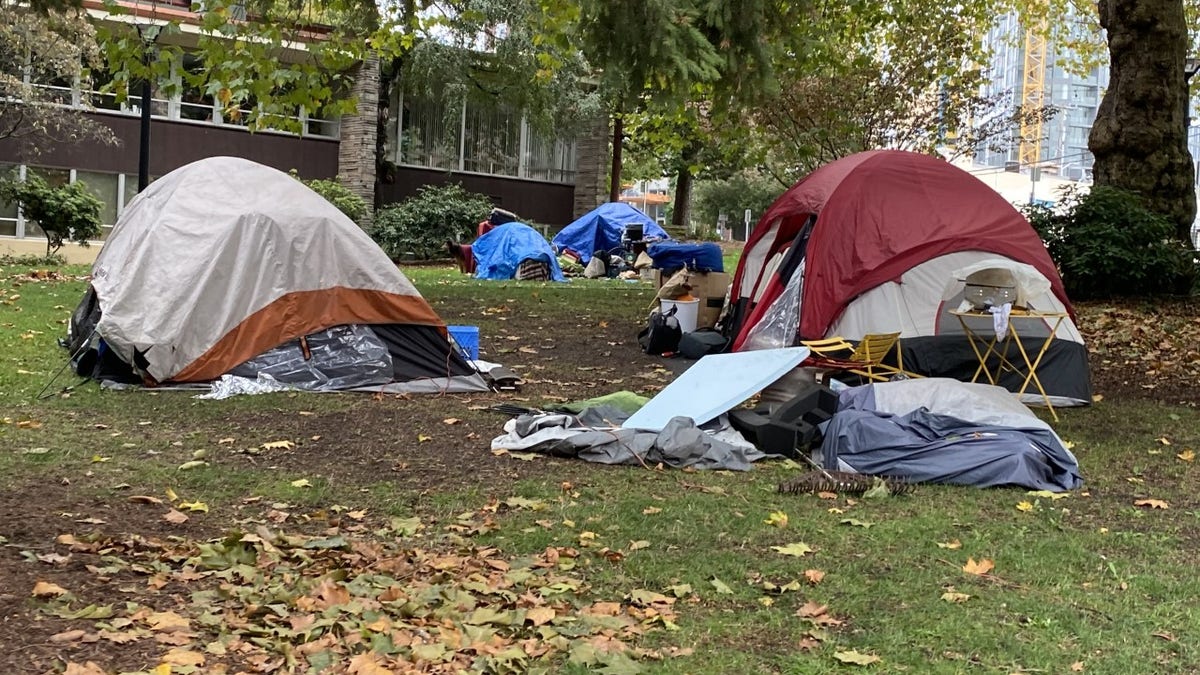Some of West Coast's homeless may soon get high-rise apartments
Dan Springer reports on new buildings funded with taxpayer money
Seattle leaders are squandering hundreds of millions of taxpayer dollars, including COVID relief funds, on pricey homeless hotels and studios that include wraparound services. Finally, they promise, this will supposedly address homelessness.
It’s already failing -- badly. And politicians are ignoring the results.
Shelter, housing, and services already exist in Seattle, yet the city’s homelessness just keeps getting worse.
City leaders rarely see their lax policies or ideological agenda as the problem. They keep throwing money at housing and refuse to take a harder line approach to the homeless people who need it. And when the subsequent (and inevitable) failure hits, they just rinse, wash and repeat. It’s happening again.
FROM HOMELESS TENTS TO PENTHOUSES WITH VIEWS
Fox News’ Dan Springer reports Seattle city leaders spent $50 million for three expensive apartment buildings with a penthouse view in the trendy Capitol Hill neighborhood. With only 165 units, each studio costs over $300,000. That’s far higher than what typical studio apartments in the Emerald City would cost to develop. Concurrently, the city is leasing hotels to house the homeless as a way to get them off the streets immediately.
Whereas Seattle leases, officials in King County, Wash. -- where Seattle is located -- are purchasing hotels shuttered by the very COVID mandates they imposed. The properties are becoming 24/7 shelters.
Under Executive Dow Constantine, King County spent over $230,000,000 to purchase nine hotels, which can house just over 1,000 homeless people. That’s just under $230,000 per room and doesn’t account for the services and staffing at these shelters.
Driven by an ideological belief that "affordable housing" is a human right, local leaders have largely eschewed encampment sweeps. With COVID relief dollars pouring in, they have taken advantage to pursue a housing-first approach. It has come with unintended consequences.
The mere possibility of a hotel room keeps many homeless on the streets, refusing services. They’re waiting for a room to become available. Anecdotally, it also appears that this policy is attracting more homeless to the area.
If this housing strategy yielded positive results, one could justify the cost instead of growing the budgets for robust addiction and mental health programs. But we’re not.
The Seattle Times recently published a follow-up on an encampment sweep a year earlier. The city of Seattle removed a dangerous and growing encampment that earned the ire of neighbors. Of the 78 homeless people offered hotel rooms through a city-backed program called JustCare, 57 agreed.

Part of a homeless camp in Seattle (Photo by Jason Rantz)
But ten months later, the homeless weren’t in permanent housing. Twenty ended up back on the streets, unwilling to follow the hotel rules or do the work necessary to address why they’re homeless. And the program couldn’t produce results on over a dozen of their participants. Many of the homeless participants incorrectly assumed the hotel space was permanent. Only six of the 57 ended up in permanent housing.
SEATTLE CITY COUNCIL UNANIMOUSLY SUPPORTS DECRIMINALIZING PSYCHEDELIC MUSHROOMS
The results were even worse for the homeless hotel operated by the city-backed Chief Seattle Club. Of the 111 who entered the program, only two graduated into permanent housing.
Putting a homeless person into a home or hotel, merely because it fits a talking point that "housing is a human right," doesn’t address why they’re homeless. After all, they weren’t born that way.
The homeless in Seattle need intense wraparound services that hold them accountable, otherwise subsidized housing will fail. It must include case management, addiction or mental health care, and job training. These programs must strictly hold the homeless accountable. Instead, programs frequently allow for drug and alcohol use; some shelters literally hand out the materials to get high.
Generally speaking, a carrot and stick approach has been the most successful in tackling the toughest cases. But the city is disinterested.
CLICK HERE TO GET THE OPINION NEWSLETTER
Not far from the city center things are a different story. Good luck finding a dirty tent city or any homeless and high campers at parks or playgrounds in nearby Bellevue, Wash. The city certainly has a homeless population, but unlike Seattle, leaders have empowered police to tackle the issue.
More from Opinion
When police encounter illegal homeless encampments, they’re actually forced to move. Bellevue Police offer a ride to a nearby shelter, and they won’t allow public spaces to be taken over by the homeless. This strategy doesn’t just clean up the city, but it connects the homeless with much-needed resources. The ones who don’t want rules come to Seattle.
Some homeless people need to be prodded to get on the right path. Seattle leaders claim "tough love" policies lack compassion.
But Seattle compassion leaves the homeless living in filth, surrounded by human waste and used needles. To keep warm, the homeless start campfires that routinely rage out of control, leading to property damage, injury, and death. Seattle has seen over 950 encampment fires break out this year. As our weather turns bitterly cold, this problem will get worse.
CLICK HERE TO GET THE FOX NEWS APP
Do local leaders change their ways when the crisis worsens and the homeless die? No. They throw even money at the issue and see no results. And when much of it comes from the federal government – bankrolled by the taxpayer in San Antonio, Texas or Tampa, Florida -- it’s tempting to try yet another progressive scheme.
One might think being 16 years into the city’s ‘Ten Year Plan to End Homelessness’ would be a wake-up call, but we’re still living in this Seattle nightmare.













































